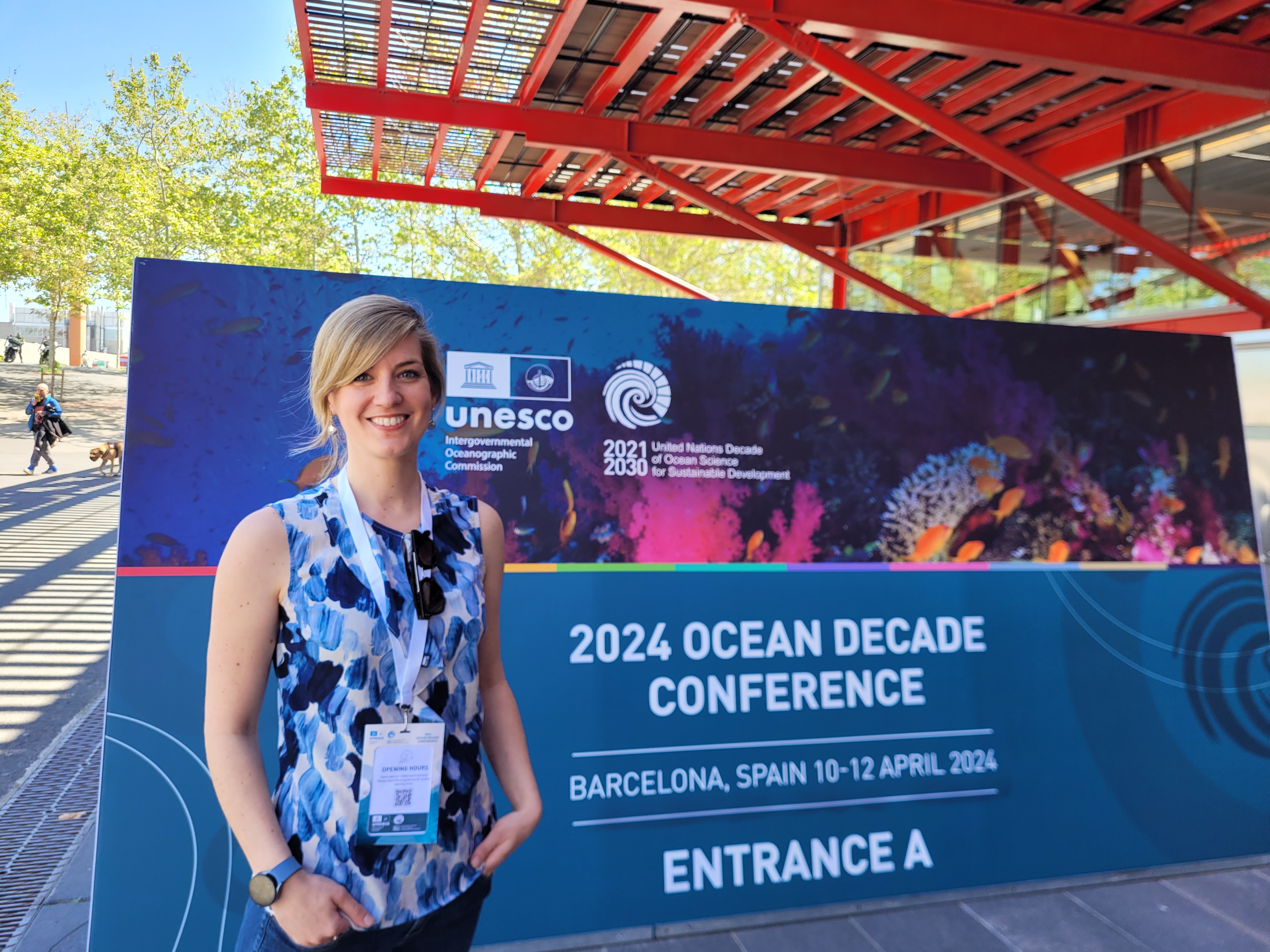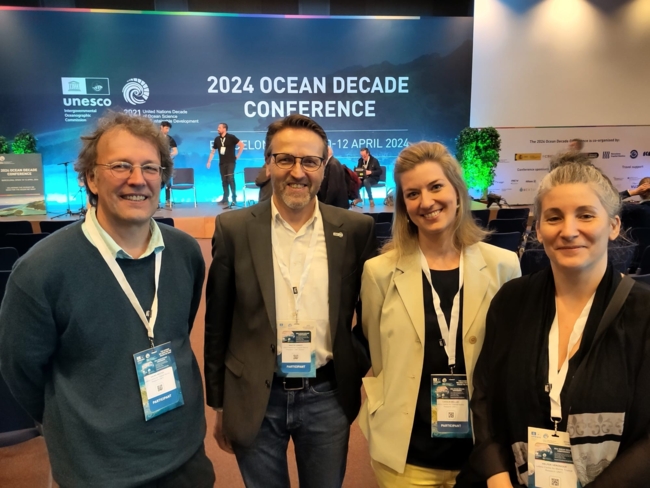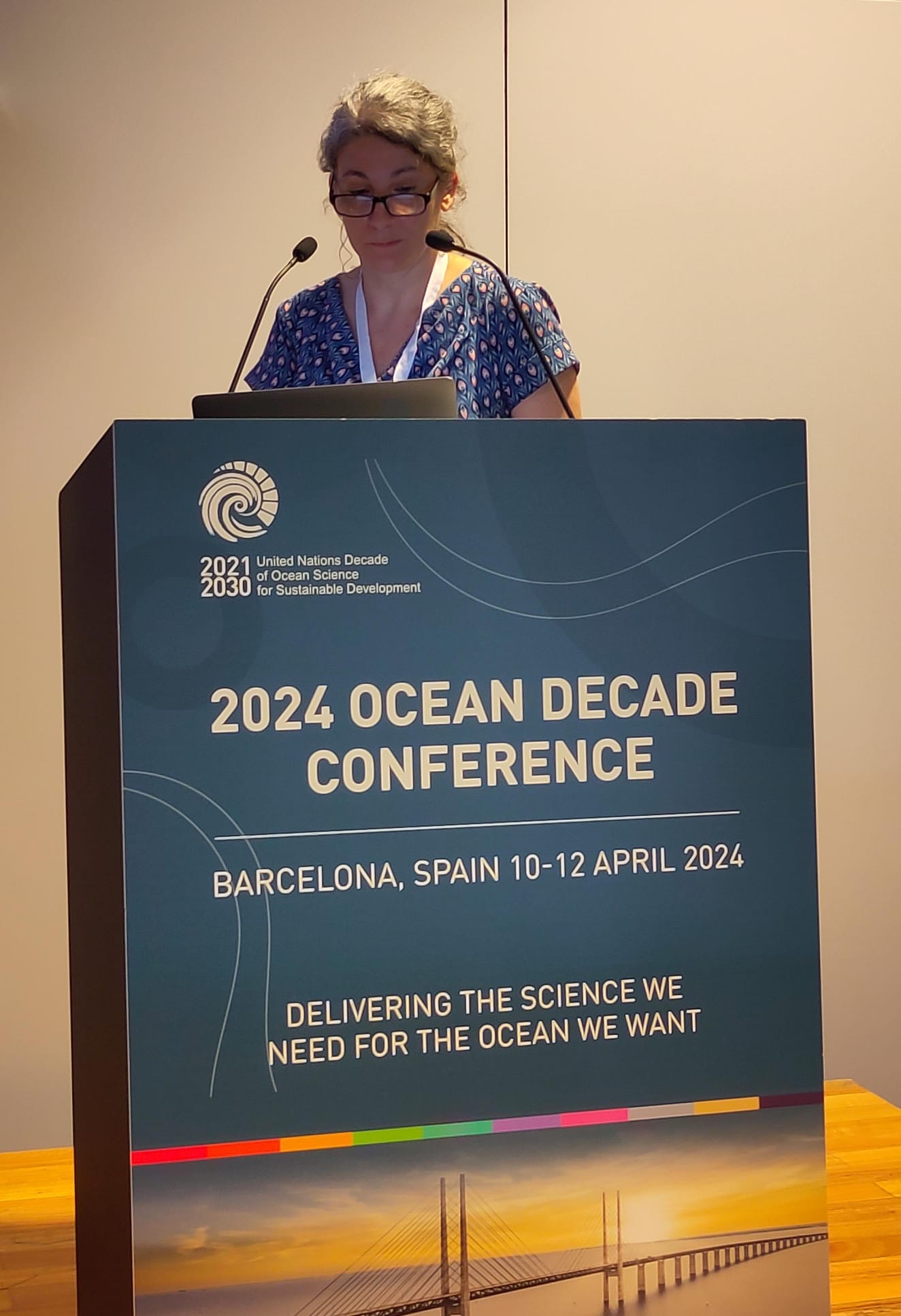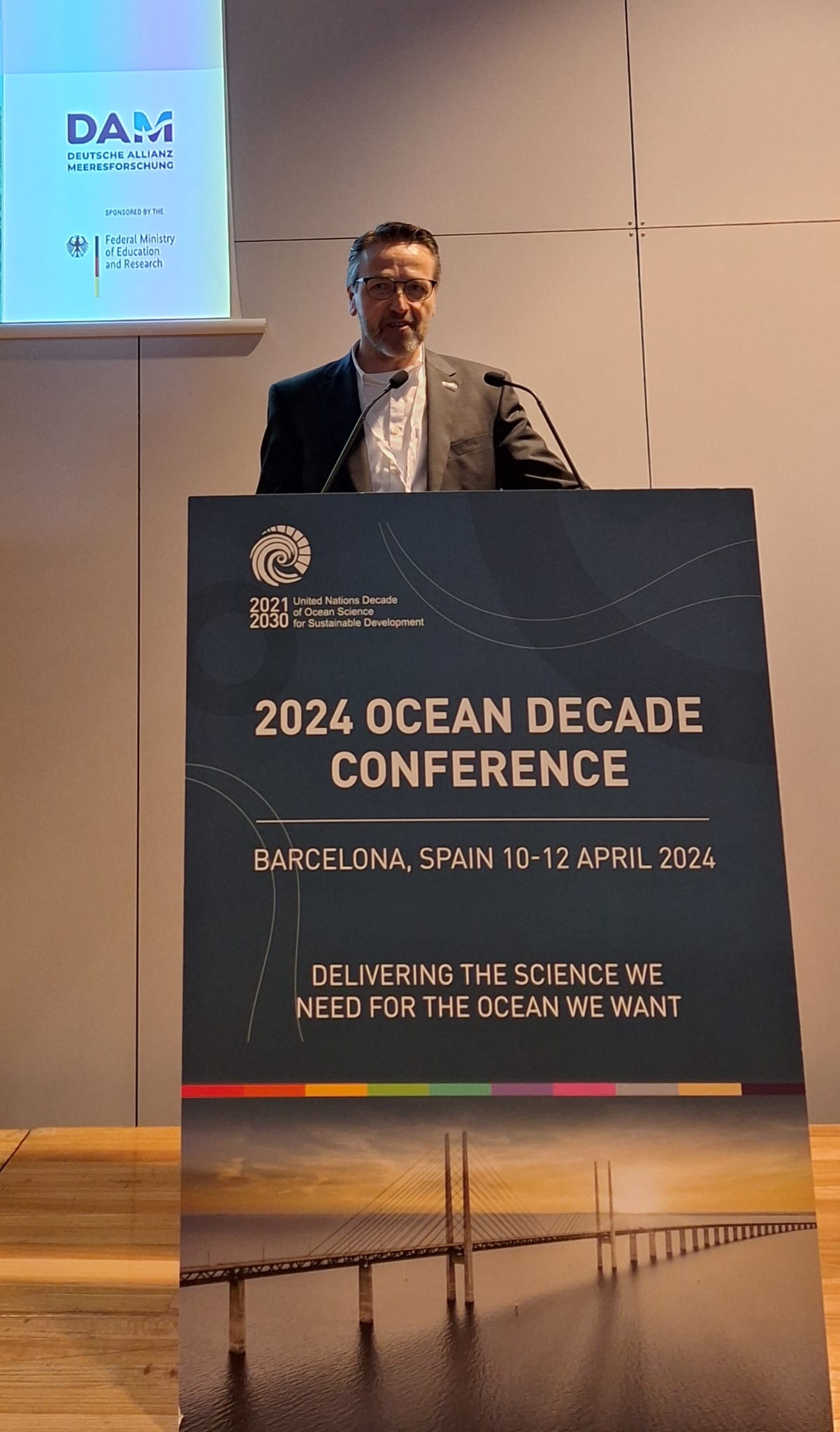02/05/2024 | More than 1,500 scientists, politicians and decision-makers, representatives of the private sector and civil society went to the UN Ocean Decade Conference in Barcelona from April 10-12. Scientists, politicians and policy-makers, representatives of the private sector and the civil society -particularly youth– from all over the world came together to discuss the state of the world's oceans. Despite the worrisome state of our oceans and coasts, the UNOD Week & Conference aspired a strong, positive spirit of optimism. From ZMT, Prof. Dr. Martin Zimmer, Dr. Véronique Helfer, Dr. Caroline Müller and Dr. Hauke Reuter attended the conference. Now that a few weeks have passed and they had some time to reflect so we have asked the ZMT researchers for a summary of their highlights and impressions from the inaugural UN Decade Conference. Here is what they say (in alphabetical order).
Dr Véronique Helfer, Senior Scientist, Mangrove Ecology working group
“This conference was full of inspiring (and moving) stories, insightful exchange and dialogues. I enjoyed to learn about ongoing scientific initiatives but also to hear the perspectives of policy, industry and civil society stakeholders.
One key contribution for me was given during the satellite event „Presenting the ‘Transdisciplinary Toolbox for Transformative Ocean Governance’“, where a woman (Mrs Lysa Wini), born in a coastal community in the Solomon Islands and who later worked for the Government in environmental and sustainable management issues, shared her story. She realized during her activities, that she totally forgot to integrate the needs and views of her own community within her daily work. She then questioned herself and asked how she can reconnect to her community, to her mother, to integrate their needs, their knowledge, their sustainable practices in her planning. Listening to this testimony brought tears in my eyes and made me realize how important and difficult it is to not lose sight of and really integrate the needs of the communities mostly depending on the resources our ocean and coastal ecosystems provide. The humility and honesty of this woman, telling us about her own story and difficulties in her practice when it comes to transdisciplinary work, was really a mind opener for me.
Another key message for me was during the satellite event “How will UNDOS biological observation programmes address the Vision 2030 recommendations for Challenge 2 “Protect and restore ecosystems and biodiversity?“, when Frank Muller-Karger (Univ. of South Florida), reminded us that we need to imagine a positive future. This is a very simple and straightforward message, but it made me realize that I often lose my positive thinking in face of the daily news we are confronted with (new data on climate change processes, effect and events, processes that climatologists themselves admit they had not expected, the ongoing biodiversity crisis), the lack of public awareness and the lack of strong decisions from our government to act efficiently against it (gladly, several world leaders present at the event stated that they will dedicate resources and human power to address the current challenges). But reading this message on the screen made clear to me that it is only with a positive mindset that we can work in a productive and creative way, in order to adress the challenges that the ocean and all living organisms depending on it, including us humans, are facing.
Finally, among the keywords that I took back with me (gender equity, equality and social justice, intersectionality, joint efforts and collaboration, FAIR data, Digital Twins, resilience), co-design was definitely a central one; this consolidates the feeling that the activities and approaches we do and will undertake and implement within PA4 at ZMT are timely and in-line with the current global efforts.
I feel humbled to have participated in the UN Ocean Decade Conference, and happy to have contributed with our satellite event "Blue Carbon Dialogue: Accelerating blue carbon-driven restoration and conservation actions" together with Martin Zimmer, Yekaterina Astafyeva from JPI Oceans and Majbritt Bolton-Warberg from the Marine Institute of Ireland.
That was a very dense and very inspiring week. It felt sad to leave the conference venue with all the nice people we met there. Now I am back home, at ZMT, with replenished energy and new ideas to pursue our work on mangrove forests and other coastal vegetated ecosystems. Let's keep on improving our understanding of the ocean and coastal socio-ecological ecosystems, to preserve their values.”

Dr Carolin Müller, Senior Scientist and Project Coordinator, Programme Area 5
“Attending the UN Ocean Decade Conference in Barcelona was an enriching and encouraging experience. The genuine dedication displayed by scientists, policymakers, and representatives from civil society to engage in transdisciplinary collaboration and co-create solutions truly impressed me.
Among the wide selection of memorable talks and presentations, the plenary session titled ‘An inspiring and engaging ocean for all’ left a lasting impact, featuring a carefully thought out keynote speech delivered by Ken Paul (Pokiok Associates). His insights ignited a sense of collective responsibility based on true and equitable partnerships, moving away from fear-based dictions towards positive notions in order to respect - rather than protect - our ocean. Following his address, a fervent panel discussion, moderated by Jacqueline Uku (Kenya Marine and Fisheries Research Institute), sparked thought-provoking conversations about how human health critically depends on ocean health. The panellists also raised the concern that all the knowledge acquired will be ephemeral if it is not transferred into diligent decision-making.
Being passionate about science communication and knowledge exchange myself, the emphasis on ocean literacy shown throughout the entire conference was particularly noteworthy for me. It aligns perfectly well with the mission and values of ZMT to enable ocean stewardship through capacity development across societal levels.”
Prof. Dr. Martin Zimmer, Head of the Mangrove Ecology working group
“I perceived two major key messages of common support. Firstly, we must remain optimistic. Only if we do not give up our hope that we can we still make a difference, we will be able to muster the energy to act. Concrete and consistent action and measures at all levels of society are crucially important now. Secondly, we can only achieve our goals if we work together – everyone, on eye-level and including young people, because it is their future that is at stake, and joining forces with local and indigenous populations in coastal regions around the world.
Inclusivity was a topic that stood out for me. As we learned at the ‘Dialogue for building bridges between intersectional gender equality and ocean science’, only 56% of male interviewees considered climate change a serious issue for humankind, when asked about the relevance of climate change, while 83% of female interviewees do. Yet, only 37% of ocean scientists are female. At the event we discussed, and learned about these and many other gender-related issues of ocean sciences, as well as the systematic and systemic disadvantages that women still encounter and have to face in science and science-based policy-making ... and indeed throughout their lives.
A real highlight and eye-opener for me was a satellite event on ‘other ways of knowing’ organised by One Ocean Hub. The event ‘Presenting the Transdisciplinary Toolbox for Transformative Ocean Governance’ started with a captivating performance about traditional Zulu knowledge on (soul) incarnation: the indigenous sacred story of ‘the soul's journey’. The beautiful marriage of this story with the natural water cycle exemplifies how indigenous and scientific knowledge can resonate. We learned about the contrast between the western scientific approach on one side and vernacular knowledge production and indigenous research practices on the other side. These can only be brought together for the sake of Co-Design-based collaboration, when we (Western scientists) acknowledge local realities and knowledge systems, often being represented by (art-based) performative knowledge such as dance or poetry. This wonderful event opened an avenue to a new level of transdisciplinarity to me.
The panel on ‘Coast Futures: Charting priorities for Resilience’ touched on an emerging and increasingly relevant research topic of ZMT's Research Program Area 4: how to foster resilient coasts through climate change adaptation. The panellists from the Netherlands, Italy, Ghana, the Philippines and India amongst others provided a multi-facetted picture of issues and potential solutions towards resilient coasts.
Despite the strong anthropocentric focus of many Ocean Decade activities, it is interesting to note that the recently challenged term "Anthropocene" was not mentioned throughout the conference or in the "Barcelona Statement" that emerged from the Conference."







